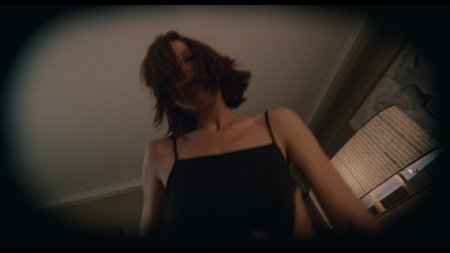
****/**** Image A Sound A Extras B-
starring John Cusack, Cameron Diaz, Catherine Keener, John Malkovich
screenplay by Charlie Kaufman
directed by Spike Jonze
 by Walter Chaw The moment you realize that Spike Jonze’s Being John Malkovich is more than just another ultra-high-concept indie calling-card is right at the end, when all that quirk reveals itself as bleak, desperate, lonesome. It’s the first time most of us conceptualized the idea of Charlie Kaufman, in fact–the moment that any follow-up became a cause célèbre. It’s silly, really, to bother trying to synopsize the film, but for the uninitiated, it’s about a failed puppeteer’s discovery of a portal behind a file cabinet on the low-ceilinged floor of an office designed for the dwarf wife of a sea captain. (“Curs-ed t’ing,” he calls her.) The portal leads, of course, to the inside of John Malkovich’s skull for around fifteen minutes before expelling the interloper to the side of the New Jersey Turnpike. Looking here, it’s possible to begin to trace Kaufman’s auteur obsessions with interiors, with language (in a job interview hinged on malaproprisms and miscommunications), with doubling, identity, surrealism, systems of belief, and, sneakily, science-fiction. What’s Eternal Sunshine of the Spotless Mind, after all, but a fairly extraordinary SF piece that just happens to be one of the best movies about love ever made?
by Walter Chaw The moment you realize that Spike Jonze’s Being John Malkovich is more than just another ultra-high-concept indie calling-card is right at the end, when all that quirk reveals itself as bleak, desperate, lonesome. It’s the first time most of us conceptualized the idea of Charlie Kaufman, in fact–the moment that any follow-up became a cause célèbre. It’s silly, really, to bother trying to synopsize the film, but for the uninitiated, it’s about a failed puppeteer’s discovery of a portal behind a file cabinet on the low-ceilinged floor of an office designed for the dwarf wife of a sea captain. (“Curs-ed t’ing,” he calls her.) The portal leads, of course, to the inside of John Malkovich’s skull for around fifteen minutes before expelling the interloper to the side of the New Jersey Turnpike. Looking here, it’s possible to begin to trace Kaufman’s auteur obsessions with interiors, with language (in a job interview hinged on malaproprisms and miscommunications), with doubling, identity, surrealism, systems of belief, and, sneakily, science-fiction. What’s Eternal Sunshine of the Spotless Mind, after all, but a fairly extraordinary SF piece that just happens to be one of the best movies about love ever made?


 **/****
**/**** ****/****
****/**** ****/**** Image
****/**** Image  by Jefferson Robbins
by Jefferson Robbins by Angelo Muredda
by Angelo Muredda by Jefferson Robbins
by Jefferson Robbins